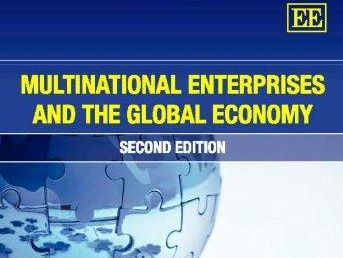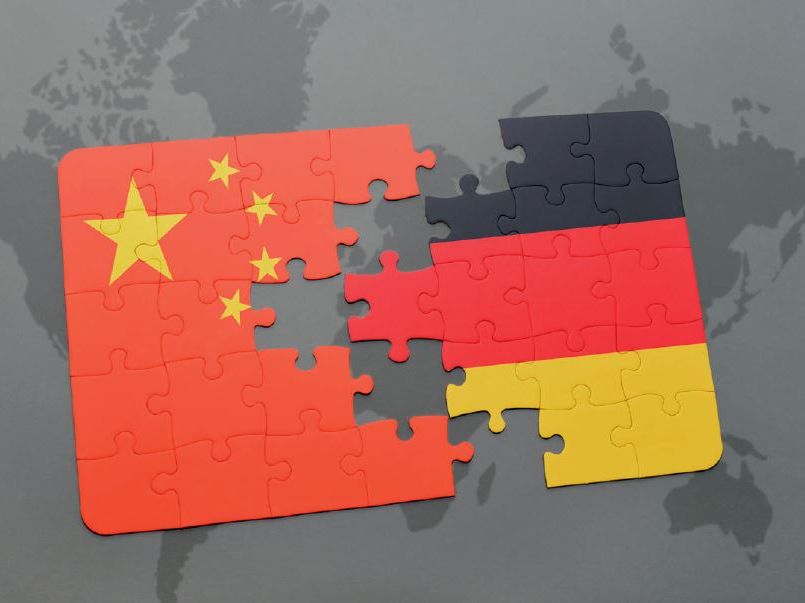Research
Research is a central component of our work. In this context, we focus on the development and publication of new scientific results through various channels. As described in our research philosophy, we cooperate with other (research) institutions and scholars to create synergies and enhance research quality. Professor Lundan is an active member of the two main research associations, the Academy of International Business and the European International Business Academy. Furthermore, she is the inaugural editor of the new Journal of International Business Policy (JIBP). In addition to these high-profile positions, she publishes regularly in top-ranked journals and presents her research at conferences around the world. The IMG team members follow this example and also participate in workshops and conferences and contribute to research in International Business through publications.
Our research concentrates on the role of multinational enterprises (MNEs) as catalysts in the economic, social and institutional transformation of home and host countries. It seeks to provide answers to a variety of policy questions arising from both outward and inward internationalization, including foreign investment and contractual forms of cross-border activity.
In addition to established questions of the impacts on employment and innovative performance in developed countries, new questions are concerned with the impact of the entry or exit of different types of investors, including new forms of state owned enterprises as well as investments controlled by sovereign wealth funds. In the specific research context of international investment activity in developing countries, the IMG contributed to a research programme led by UNCTAD in Geneva.
The IMG examines research questions that meld together the business and management perspective under the theme of MNEs and governance and the economic viewpoint under the theme of policy and public/private governance. In both of the main research domains of the Working Group, fundamental problems of complexity and governance arise from the interactions between multiple actors, including MNE headquarters, semi-autonomous subsidiaries and a variety of public institutions at the local, regional, national and supranational levels. Only a comprehensive view on the above-mentioned aspects allows to generate new knowledge as well as new practice-relevant concepts about the multinational activities of companies.
An overview of all of the research conducted by the IMG can be found here.
Multinational Enterprises and Governance
The Working Group International Management and Governance investigates the changes in the strategies and structures applied by MNEs in response to uncertainty and complexity in cross-border activities. This includes theoretical research, guided by evolutionary perspectives and the business capability approach, as well as empirical projects that investigate forms and patterns of internationalization of large and small MNEs.
The research on MNEs encompasses both theoretical and empirical contributions. The theoretical contributions examine the development and transfer of new routines (capabilities) within and across firms, and between firms and various nonmarket institutions. The empirical research is mainly oriented to the internationalization process of firms, and subdivides itself into studies that focus on comparing the extent and forms of internationalization of small and medium-sized firms and large MNEs from developed economies, and studies which examine the extent to which internationalization strategies tend to be regional or global in scope. Such studies aim to uncover the reasons for the limited geographical reach of many of the world’s largest MNEs, as well as to understand the context in which some smaller MNEs are able to internationalize extremely rapidly.
Policy and Public/Private Governance
The research of the IMG improves the understanding of the conditions under which cross-border activities by multinational companies contribute to the development of the host country. In addition to the economic impact, the variety of influences on the host country will be investigated. This includes transformative impacts and new governance approaches as a result of the cross-border activities of MNEs.
The aim of the research is to provide policy relevant analysis of the changing forms of cross-border activity and the expanding role of MNEs in standard setting and various hybrid forms of public and private regulation. In developed economies with similar outward and inward investment positions, significant parts of the national economy are effectively controlled by foreign enterprises.
In the wake of global crises, there is a need to revisit analyses of the differences between domestic and foreign firms to arrive at a better understanding of the true benefits and costs of economic openness, particularly in the context of global resource constraints. In developing and emerging economies, new policy questions arise from increasing outward investment, and the impact of institutional voids on economic and social development.
- Contributions to the theory of the MNE, particularly from a co-evolutionary and capabilities-based perspective
- Theoretical contributions on the role of MNEs in institution building, particularly in connection with national and supranational regulatory regimes, self-regulation
- Large sample empirical research on the internationalization patterns (regional vs. global) of medium-sized and large MNEs from developed economies
- Management and coordination of hybrid hierarchical/contractual value chains across borders
Boddewyn, J.J. and Lundan, S. M. (2010).The internalization of societal institutions. Baruch College and the University of Bremen.
Cantwell, J.A.; Dunning, J.H. & Lundan, S.M. (2010). An evolutionary approach to understanding international business activity: The co-evolution of MNEs and the institutional environment. Journal of International Business Studies, 41(4): 567-586.
Lundan, S.M. (2010). What are ownership advantages? Multinational Business Review, 18(2): 51-69.
Dunning, J.H. & Lundan, S.M. (2010). The institutional origins of dynamic capabilities in multinational enterprises. Industrial and Corporate Change, 19(4): 1225-46.
Dunning, J.H. & Lundan, S.M. (2009). The internationalization of corporate R&D: A review of the evidence and some policy implications. Review of Policy Research, 26(1-2): 13-33.
Lundan, S.M. (2009). Distance-related barriers and the internationalisation of Finnish MNEs. Helsinki: The Research Institute of the Finnish Economy (ETLA) Discussion Papers No 1193.
Dunning, J.H. & Lundan, S.M. (2008). Institutions and the OLI paradigm of the multinational enterprise. Asia Pacific Journal of Management, 25(4): 573-593.
Dunning, J.H. & Lundan, S.M. (2008). Multinational Enterprises and the Global Economy. Second Edition. Cheltenham: Edward Elgar.
Lundan, S.M.; Tolvanen, J. (2008). Regional and Global Patterns of Internationalisation of Finnish MNEs. Helsinki: The Research Institute of the Finnish Economy (ETLA) Discussion Papers No 1170.
Lundan, S. M. (2002). Network Knowledge in International Business (ed.). Cheltenham: Edward Elgar, New Horizons in International Business, series editor Peter Buckley.
Lundan, S.M. & Jones, G. (2001). The 'Commonwealth effect' and the process of internationalization. The World Economy, 24(1): 99-118.
- Conceptual development of a new paradigm for development outlining the broader role of MNEs in economic and social development through institution building and transfer
- Empirical research on spillovers from foreign investment as a function of institutional and governance distance
- The policy relevance of contractual value chains, and particularly the contractual provisions concerning labour market standards in developing countries
- The role of MNEs in shaping the protect-respect-remedy framework for human rights, particularly in terms of the balance between soft and hard forms of rulemaking
- The enlarged role of multinational enterprises (both domestic and foreign) in the development of technical and operational standards and the evolution of regulatory regimes
- The implications of changes in the ownership of productive assets, including increased state participation as a result of global crises, the prominent role of state owned enterprises in emerging economies, and the role of sovereign wealth funds as direct investors
Lundan, S.M. (2011). Multinational enterprises and global justice. In: J. Linarelli (ed.), Research Handbook on Global Justice and International Economic Law. Edward Elgar: Cheltenham.
Fortanier, F. & Lundan, S.M. (2010). Inward FDI and economic growth: The role of home and host country institutions. University of Amsterdam and University of Bremen.
Lundan, S.M. (2010). The co-evolution of transnational corporations and institutions. Indiana Journal of Global Legal Studies.
Lundan, S.M. & Dunning, J.H. (2010). The changing political economy of foreign investment: Finding a balance between hard and soft forms of regulation. In: Alvarez, José E. & Karl P. Sauvant (eds..), The Evolving International Investment Regime: Expectations, Realities, Options. New York: Oxford University Press.
Lundan, S. M.; Hafiz, M. (2010). TNC evolution and the emerging investment-development paradigm. Transnational Corporations, 19(2): 29-52.
Dunning, J.H. & Lundan, S.M. (2008). Multinational Enterprises and the Global Economy, Second Edition. Cheltenham: Edward Elgar.
Lundan, S.M. (2007). The home country effects of internationalisation. Helsinki: The Research Institute of the Finnish Economy (ETLA) Discussion Papers No 1100.
Lundan, S.M. & Brewer, T. (2006). Environmental policy and institutional transparency in Europe. In: Lars Oxelheim (ed.), Corporate and Institutional Transparency for Economic Growth in Europe, 93-116. Oxford: Elsevier.
Lundan, S.M. (2004). Multinationals, Environment and Global Competition (ed.). Oxford: JAI (Elsevier), Research in Global Strategic Management, 9, series editor Alan Rugman.





